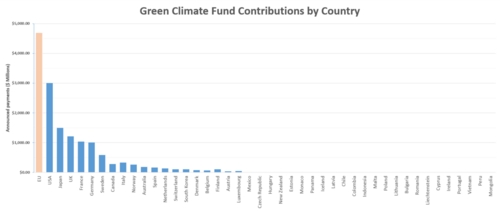Green Climate Fund
Considered the world's largest fund of its kind, GCF's objective is to assist developing countries with climate change adaptation and mitigation activities.
These include ongoing questions on how funds will be raised,[7] the role of the private sector,[8] the level of "country ownership" of resources,[9] and the transparency of the Board itself.
[16][17] A number of civil society groups determined that the United States and the European Union are morally responsible for at least 54% of the cost of mitigating climate change-driven disaster damage in the Global South.
[21][22] During COP-16 in Cancun, the matter of governing the GCF was entrusted to the newly founded Green Climate Fund Board, and the World Bank was chosen as the temporary trustee.
[23] Researchers at the Overseas Development Institute state that without this last minute agreement on a governing instrument for the GCF, the "African COP" would have been considered a failure.
[24] Furthermore, the GCF Board was tasked with developing rules and procedures for the disbursement of funds, ensuring that these should be consistent with the national objectives of the countries where projects and programmes will be taking place.
[23] The fund partners with 84 organizations that include commercial and development banks, state agencies and civil society groups, which pilot and execute innovative approaches to climate programs.
Uncertainty over where this money would come from led to the creation of a High Level Advisory Group on Climate Financing (AGF) by UN Secretary-General Ban Ki-moon in February 2010.
Former U.S. President Donald Trump in his announcement of U.S. withdrawal from the Paris Agreement on 1 June 2017, also criticized the Green Climate Fund, calling it a scheme to redistribute wealth from rich to poor countries.
[10] In addition, questions have been raised about the need for yet another new international climate institution which may further fragment public dollars that are put toward mitigation and adaptation annually.
But in at least one case it also drew praise for involving local communities in the formulation of an adaptation project, and for incorporating consumer protection into a plan for off-grid solar energy.
Many of the developed countries represented on the GCF board advocate a PSF that appeals to capital markets, in particular the pension funds and other institutional investors that control trillions of dollars that pass through Wall Street and other financial centers.
[28] At its board meeting in South Korea held in March 2015, the GCF refused an explicit ban on fossil fuel projects, effectively allowing for the funding of coal plants.

